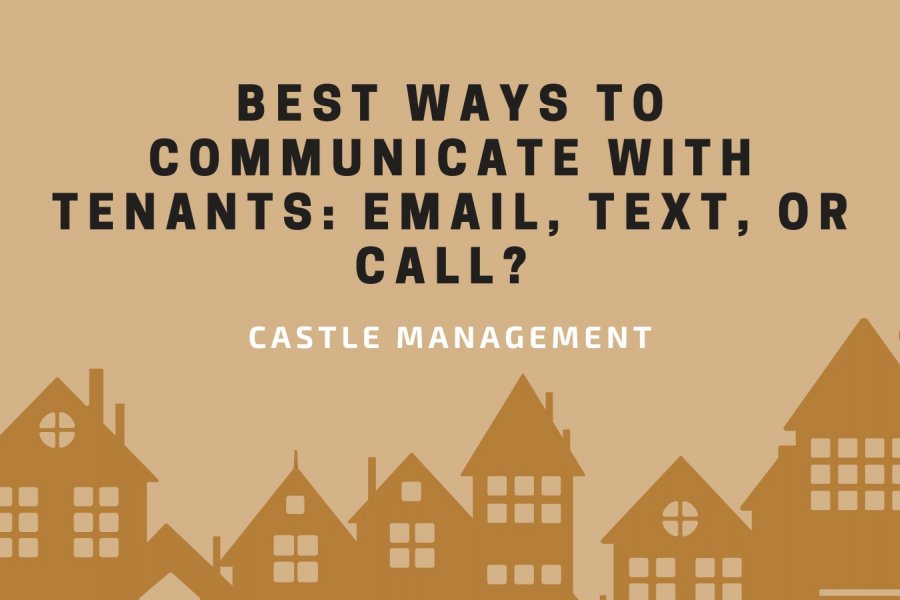
Effectively communicating with tenants has never been easier! There is a variety of options in this regard, including text, call, email, and other digital options available.
That said, with such many options available comes the complexity of regulations and user preferences. That’s why as a landlord, it’s crucial that you choose the best communication method for your tenants.
While you could text, email, or call your tenant, certain communication channels are best suited for certain situations. The following is everything you need to know when it comes to the best communication channels for your tenant.
Phone Calls
Calls are inevitable in any landlord-tenant relationship. A tenant may need to call you when making a repair or maintenance request, for instance. On your part, you may need to call your tenant when, say, you want to schedule an inspection of the property.
Generally, the following are scenarios when calling your tenant would be ideal rather than texting or emailing them.
-
When seeking clarity or additional information. In this situation texting or emailing the tenant can seem a bit impersonal as they may not allow for back-and-forth communication on complex matters.
-
When the matter involved is urgent. In case of emergencies, for instance, a phone call would be the quickest channel of communication.
-
When making courtesy reminders, phone calls can help eliminate potential lease violations or unnecessary late notices.
Tips for Calling Tenants
If you don’t handle phone calls the right way, it has the potential to lead to frustration. It’s essential to use the right etiquette for proper communication.

The following are some tips to keep in mind when calling your tenant:
-
Uphold a high level of professionalism. Be upfront about the reason for calling the tenant. Avoid being too chatty or overtly friendly. These have the potential to upset the tenant. At worst, the tenant could also find your call to be harassing or passive-aggressive.
-
If you can’t get hold of the tenant, ensure you leave a detailed voicemail. This will increase the likelihood of the tenant getting back to you. Otherwise, simply saying “Please call me back” may lack a clear purpose and the tenant may not see the urgency to call you back.
-
Call during normal business hours. As a landlord, you must respect your tenant’s privacy. As such, only call between 8 AM and 5 PM, unless the call is due to an emergency.
-
Be personable for good customer service. Please remember that property management is in the service industry. How you communicate with a tenant can either encourage or discourage repeat business.
Just like phone calls, emails can be effective communication tools between a landlord and a tenant. The following are scenarios where using emails can be ideal for landlords.
-
When sharing pictures, infographics, graphics, or other visual information with your tenants.
-
When you constantly need to remind your tenants of certain information, such as due rent or added charges.
-
When communicating with the tenant about new policies or procedures. Emails can ensure you relay such information quickly and reliably.
-
When looking to have documentation of the communication. Emails can help provide a time-stamped record.

Tips for Emailing Tenants
As you can see, emailing can be a great communication tool for landlords. However, you must do it right to reap maximum benefits.
The following are some things to keep in mind when emailing your tenants:
-
Send complete and coherent emails to your tenants.
-
Have a clear purpose when sending the emails to ensure it isn’t flagged off as spam.
-
If sending an attachment, double-check to see that it’s included.
-
Respect the tenant’s privacy and only send emails during normal business hours. The last thing you want is to bother the tenant with emails.
Texting
Other than calls and emails, texts are also a common communication tool you can use. The following are some reasons why you should consider them.
-
They have high open rates. Some studies have quoted open rates of up to 99%.
-
Are universal regardless of whether the tenant is using a smartphone or a feature phone.
-
The response rate is high.
To enjoy such benefits, however, you must ensure that you follow certain best practices.

Tips for Texting Tenants
When texting tenants, make sure you do the following for optimum results:
-
Get the tenant’s permission first. You can require that the tenant assent to this when signing the lease agreement.
-
Let them know the frequency of texts to expect from you. For instance, you can limit the texts to things like seasonal maintenance reminders, rent due dates, and repair updates.
-
Make every text worthwhile. Make sure that every text has a clear purpose and meaning to ensure the tenant finds them valuable.
-
Let the tenant know when they can text you. In other words, limit what information they can text you. For instance, when they need to report non-urgent matters like a broken appliance or a clogged drain. Let the tenant know that for other essential issues, they must email or call you directly.
Bottom Line
Choosing the best method of communication is key as a landlord, especially when handling multiple tenants in a multi-family unit setup. This is essential to building a longstanding relationship with your tenants.
To choose the best communication method, consider the urgency and purpose. You should also be mindful of the kind of tenants you’re dealing with. Most millennials prefer text-based communication, for instance.
For help in any aspect of property management, please don’t hesitate to get in touch with Castle Management. We specialize in providing reliable, professional residential and commercial property management throughout the Bay Area. Get in touch to learn more!
